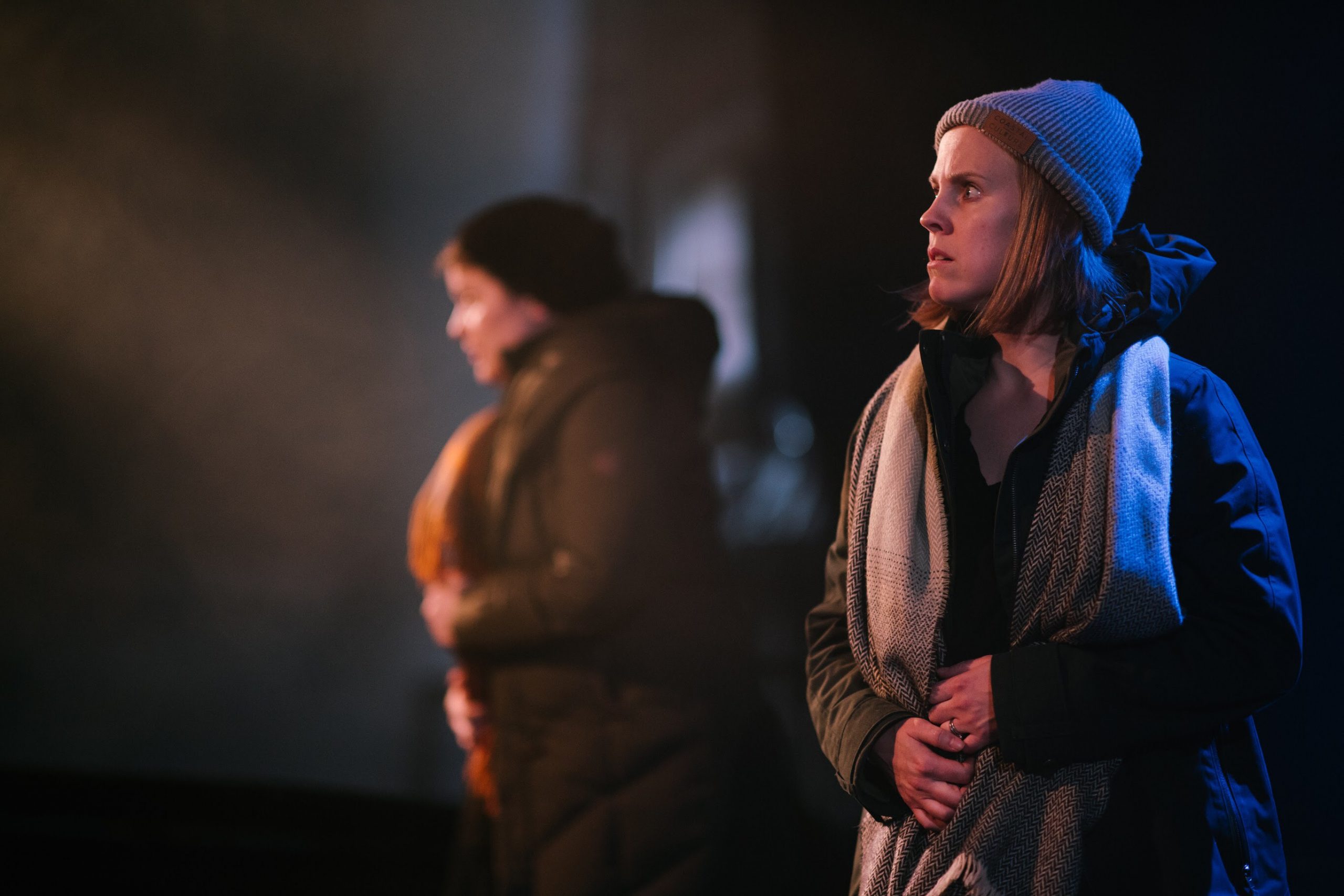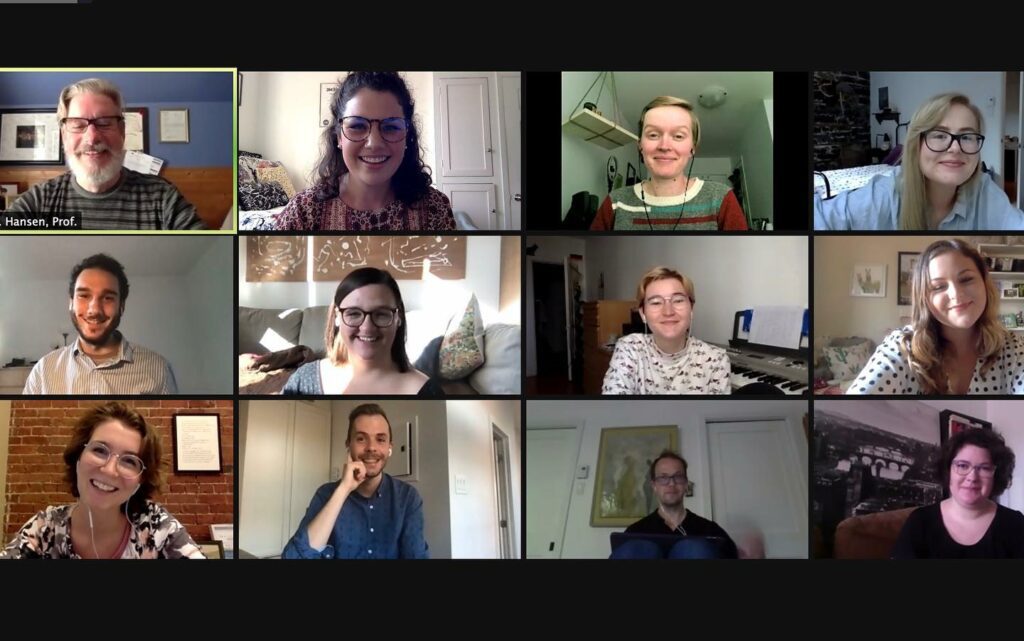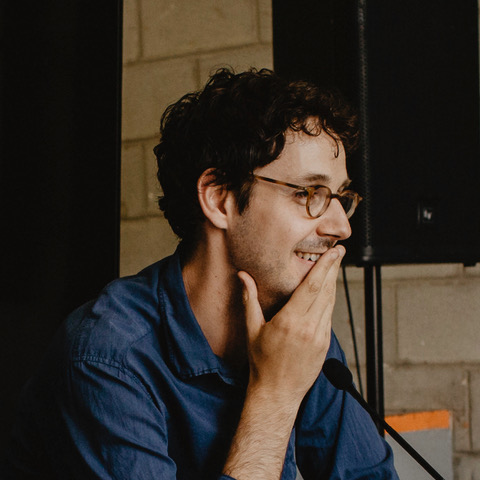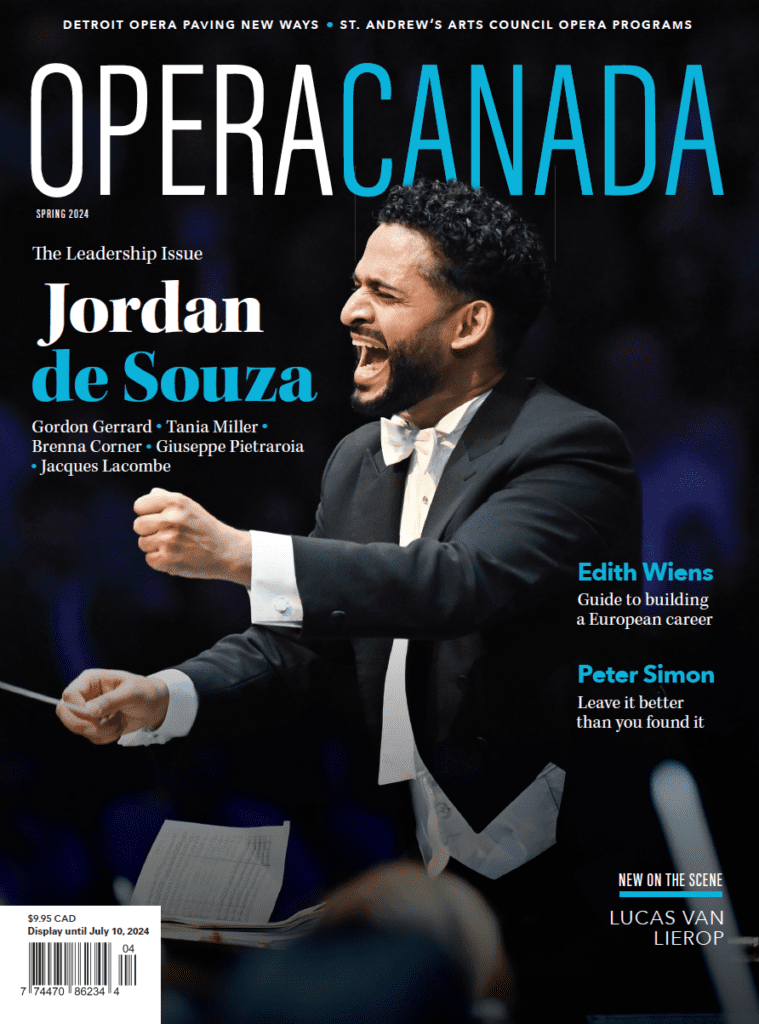Opéra de Montréal
The biggest factor in determining a company’s mood during these turbulent times seems to be the size of its overhead. “I’m very happy not to own an opera house right now,” says Patrick Corrigan, General Director of Opéra de Montréal.
Like everyone else, the tail end of their 19/20 season was cancelled. Two chamber works for smaller stages were salvaged and postponed til the fall: Poulenc’s La voix humaine and Laurence Jibodon and Pascale St-Onge’s L’hiver attends beaucoup de moi. Resources must be conserved.
“There’s no way they’re going to allow anybody to fill an opera house until this thing is behind us…” Corrigan says. “These [saved] projects will put money in the hands of the chorus, soloists, orchestra, and the technicians as well.”
That both of these short works are written to French libretti, and one is a world premiere of a work by Québecois artists, reflects a strategic doubt about ‘generic’ grand opera and a belief in the ‘accomplished artistic terroir’ of the province. It also speaks of an unmet demand for opera—live or streamed—in Montréal and beyond.
“We need to play an important role in francophone communities across Canada,” says Corrigan, who was moved by the support of over 3,000 people who donated their Magic Flute tickets instead of asking for refunds. The gesture signals a dedicated public who will, presumably, appreciate the company even more when it presents more of their stories, and voices, onstage.
Broadcasts will start in the fall with archival recordings of productions previously filmed in high definition, including their 2017 La Bohème. Audiences can expect a full announcement in September.
UPDATE: On Oct. 8th, OdeM announced it will receive $700,000 in financial support from the Government of Quebec, received as part of the Ministère de la culture et des communications’ Ambition numérique initiative. This subsidy will allow the company to establish a digital incubator serving the Québec opera sector. For the OdeM, this represents no less than seven recording and webcast projects and over 900 fees paid out to artists and artisans over the next three years. Partner companies in this project are: Opéra de Québec, Société d’art lyrique du Royaume, Chants libres, Musique 3 femmes, and Ballet Opéra Pantomime. The funding will help OdeM will kick off its digital programming with a free stream of La Bohème beginning Oct. 22nd, and the Voix/L’hiver double bill on Nov. 5th. Tickets for the latter can be purchased for $20.
One of the pandemic-related problems facing OdeM is finding rehearsal spaces big enough for social distancing in Montréal. Rehearsing Julien Bilodeau and Michael Marc Bouchard’s new, full-scale La beauté du monde, scheduled for March, means gathering a hundred people, including the orchestra. Place des Arts’ rehearsal halls are available, but may not be big enough. At one meeting, the Olympic stadium was brought up as a possible solution–probably as a joke.
The company’s training arm, the Atelier Lyrique, will have its full year, while new educational programs for small groups and broadcast will reflect Corrigan’s sense that the company has a “responsibility to the community.” covidOpéra is a project with the social integration nonprofit, la Gang à Rambrou, that has small groups rewriting arias into sketches for the stage. OdeM has produced a video of playwright Michel Marc Bouchard explaining opera librettos for the school board to broadcast. The company also anticipates a bigger project as one of ten partners in a province-wide rethinking of school libraries as cultural spaces.
Opera McGill
At the other extreme, who is better positioned to weather a performing arts shutdown than a university opera company with academic staff on someone else’s payroll and performers only owed course credits? Ticket sales at Opera McGill account for only 20-25% of the budget. Sitting in a web of audio-visual infrastructure and free student labour, its problems are more logistical than existential. Seizing the opportunity, they have planned a digital season with a focus on small operas conceived for radio and television. If stage performances become possible, that’s a bonus, but not necessary.
“I’ve been able to take most of my production budget and put it into people,” says Opera McGill Director, Patrick Hansen. Budgets for staging and costumes were swapped for cameras, camera-people, editing and microphones. Without the worry of contagion, the worst that can happen is the “students will get really great recordings.” And with everybody on a computer, there’s no competition for rehearsal space; many productions can be prepared at the same time. The result is a multitasking season with an abundance of roles—63 students in 86 roles—and a forgiving approach to casting since “voices will all equal out in the studio,” according to Hansen.
McGill’s digital season starts in collaboration with Tapestry Opera to present nine, five-minute mini operas that originated in the Toronto company’s Composer-Librettist Laboratory (LIBLAB), conducted by Jordan de Souza (from his home in Berlin) and coached remotely by pianists Michael Shannon and Jennifer Szeto as part of the Opera McGill Digital Opera Project festival. The program applies the methods Tapestry developed to digitally rehearse their Rocking Horse Winner earlier this year. This will be followed by Menotti’s Old Maid and The Thief, in its original 1939 version written for radio.
January 2021 brings Britten’s Turn of the Screw, with the orchestra potentially onstage and six singers in the audience vocalizing to the cameras. Verdi’s Un giorno di regno follows in February, with students hopefully permitted to interact by then. Three works sharing one set design and small casts of five to six are planned for the spring: Handel’s Partenope, Rodgers and Hammerstein’s Cinderella (originally conceived for television), and Joseph Bologne’s only surviving opera, L’amant anonyme (1780), for which Hansen intends to reconstruct a performing edition for its Canadian premiere. Auditions were all done digitally, and coaching and rehearsing remotely has uncovered new ways to pay attention.
“The microphone picks up stuff that might get clouded by the soundscape. I can really talk about diction and phrasing,” says Hansen. Acting for the camera is a challenge too, so he’s telling students to watch their videos with the sound off, and listen with their eyes.









